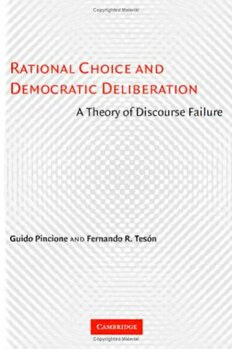
Rational Choice and Democratic Deliberation: A Theory of Discourse Failure PDF
271 Pages·2006·8.76 MB·English
Most books are stored in the elastic cloud where traffic is expensive. For this reason, we have a limit on daily download.
Preview Rational Choice and Democratic Deliberation: A Theory of Discourse Failure
Description:
In public political deliberation, people will err and lie in accordance with definite patterns. Such discourse failure results from behavior that is both instrumentally and epistemically rational. The deliberative practices of a liberal democracy (let alone repressive or non-democratic societies) cannot be improved so as to overcome the tendency for rational citizens to believe and say things at odds with reliable propositions of social science. The theory has several corollaries. One is that much contemporary political philosophy can be seen as an unsuccessful attempt to vindicate, on symbolic and moral grounds, the forms that discourse failure take on in public political deliberation. Another is that deliberative practices cannot be rescued even on non-epistemic grounds, such as social peace, impartiality, participation, and equality. To alleviate discourse failure, this 2006 book proposes to reduce the scope of majoritarian politics and enlarge markets.
See more
The list of books you might like
Most books are stored in the elastic cloud where traffic is expensive. For this reason, we have a limit on daily download.
